- Home
- Peter D Wilson
Skiddlethorpe and other stories Page 12
Skiddlethorpe and other stories Read online
Page 12
mentioning in the hope of useful information that she was to visit a Brian Hoskins: he was away for the week, but a neighbour might know where if the business was urgent. One of them could only say that it was somewhere in Scotland, but the other had contact details, and it turned out that the hotel had a last-minute cancellation for the next two nights; would she like to be picked up from the station? So it was arranged.
Fortunately it was on the main line to the far north, so the journey was straightforward. On checking in she asked if Mr. Hoskins was there.
“That’s his key, so probably not. Is he expecting you?”
“No, this business came up suddenly and I wasn’t able to warn him.”
“Shall I tell him you’re here when he comes in?”
“Thank you, but the name wouldn’t mean anything to him. I’d prefer meeting him to come as a surprise.”
The girl was a little taken aback. “A pleasant one, I hope.”
“So do I!”
Come dinner time, she asked the maitre d’ to identify Hoskins to her without attracting his attention. He was eating alone, which simplified matters, and afterwards she found a seat in the lounge within his line of vision. He clearly took appreciative notice of her and with a rather more subtle variant on the old dropped-handkerchief routine, she was soon able to get into the conversation that on past experience she was confident he would welcome. It was her first visit to the area, but by no means his, and the expected offer to show her around came very readily. They arranged to breakfast together.
During that meal, however, the receptionist came to tell him of a telephone call. On returning, he explained very apologetically that he’d have cancel their arrangement, or postpone it a day (Olga assured him that the morrow would be quite satisfactory) as his cousin’s widow needed help to settle a problem with her late husband’s estate.
“She’s only recently bereaved, then?”
“No, it was over a year ago. An odd business - he’d been called to a meeting in a Tyrolean hotel, but the other fellow didn’t appear. It turned out that he was in some criminal gang that had been wiped out by a rival lot that afternoon.”
Olga was startled, but mentioned having heard of such an incident about that time involving a character called Weston.
“Weston! Yes, that was the name. I should have remembered; Doris was always going on about what a pest he was. Forever wanting information about my work, but wouldn’t ask me directly. Anyway, whether it was due to that shock I don’t know, but during the night Martin himself had a fatal heart attack.”
“How awful! I hope you can sort out the problem.”
“I don’t suppose it’s anything serious. Doris always tends to fuss. She’s no need to; Martin left her pretty well provided.”
That relieved one of Olga’s qualms. Brian left her with suggestions for occupying the day and they arranged a time to meet for dinner.
The following morning Brian suggested an itinerary, including the reconstructed Iron Age lake dwelling on Loch Tay, the Ben Lawers visitors’ centre particularly for its explanation of the rather surprising local geology, and then perhaps the 5000-year-old Fortingall yew tree. Olga was happy to agree, since as she said, he knew the area and she didn’t. However, she found the tortuous track over the pass into Glen Lyon decidedly hair-raising, and eventually had to ask for a stop as she was feeling rather queasy.
They got out and Olga went to the edge, breathing deeply and admiring the view. Brian, with a fit of sneezing, failed to hear another car descending the slope, far too fast. It rounded a sharp bend, skidded and headed straight for him. Olga hurled herself at him, sending him staggering clear, but was herself caught by the car’s sliding rear end and flung on to an exposed rock.
Her last thought was of relief at having finally cleared her debt to Martin Barratt’s family.
Return to Contents
FANTASY
My nephew Tybalt (don’t ask!) has a penchant for avant-garde theatre. Lacking a venue wherein his wonders to perform, not to mention the little matter of a production company, he develops his ideas as animations on a computer, rather like Peter Jackson’s pre-visualisations for “The Lord of the Rings.” When Lucy and I called on him one day, he was in the midst of working on one of his creations and said we could see it if we wished, rudimentary though it still was. It would have been churlish to decline, despite my misgivings about being asked to comment afterwards.
The “stage” set was an almost barren rocky landscape in dull browns, arranged to give a perspective of some distance. On a ledge down left was a large round blob of a faintly bluish white. Roughly centre stage was another, up right a third, smaller than the others even allowing for the perspective. Call them A, B and C. Up centre was a sort of glowing brazier.
Suddenly blob A unfolded as a tall tubular creature crowned with waving tentacles, and at brief intervals B and C followed suit. C started wandering about and B called out to it that getting too close to the brazier would be dangerous, but to no effect: C did get too close and exploded.
The set cleared and a crude cut-out drawing of an airliner was drawn across the proscenium, stage right to left, buckling somewhat as it moved. The implication was apparently that A and B were aboard. As it vanished into the wings, a sign of the “Keep off the grass” kind appeared down left, actually labelled “ALGERIA”.
That was as far as it went. “What the hell was all that about?” I asked. “Those sea anemones or whatever they were - what are they supposed to represent?”
“I haven’t the faintest idea. It was a dream I had the other night, and thought I might be able to make something of it.” Tybalt, I should say, rather prides himself on his weird dreams, and this was just about par for the course.
“And have you?”
“Not yet. I’m still working on it.”
“Something about airport security and keeping children under control, perhaps?”
“Hmm. I suppose that might have possibilities. I’ll think about it.”
Months later, at a loose end after the first session of a two-day meeting in a distant city, I passed a cinema and wondered if it might have anything worth seeing. There were apparently half a dozen different auditoriums (or should that be auditoria?) but nothing currently on offer appealed to me; however, in the “Coming Shortly” window was an image just like Tybalt’s stage set, complete with sea anemones, though with the addition of a practically naked and decidedly over-developed young woman sprawled across one of the rocks. I suppose the effect was intended to be erotic, but to me it was simply grotesque; perhaps I’m getting too old to appreciate such things. There must have been a title of some sort superimposed upon it, but I don’t remember, so maybe the figure distracted me more than I admitted to myself.
Back home, I phoned Tybalt and asked if his fantasy had actually come to fruition. “No such luck,” he said. “I worked it up a bit from what I showed you, but it never looked promising enough to be worth continuing. Why do you ask?”
I told him of the cinema poster and he laughed. “Oh, that. A friend in the production business called a while back and I let him see it. He knew someone who was looking for ideas and might be interested, but all that came of it was a licence to use some of the artwork in a science-fiction epic - probably less to do with science than porridge has with haute cuisine, but that’s what they call it.”
“Have you seen what they’ve done with it?”
“The bit of crumpet on the rocks, you mean? It’s within their rights. They’ve paid for it; not much, but ...”
There was no need to go on. I commiserated and left it at that.
I thought of his porridge when a film came out purportedly blowing the whistle on an industrial topic about which I actually knew something. I was pretty sure of what it would be like but of course had to see it, especially after a correspondent in the local paper praised it to the heavens for exposing concealed dangers.
It turned out worse than I feared, and I wrote to the paper pointin
g out that the risks were minute compared with those everyone took with scarcely a thought, and that a lot of the claims were essentially guesswork. The letter was published, but in the next week’s issue was a rebuttal that in the context of the writer’s not entirely accurate information did make sense. It referred to a web site, again reasonable in its own terms, with a contact address. Given the unusual tone of the material I thought it worth suggesting a meeting to discuss it.
The response, though wary, was positive, and a few evenings later I duly turned up at 38 Dorchester Gardens. “Gardens” was a bit optimistic, but the property along the road generally looked neat and well-maintained; when a middle-aged man opened the door I honestly complimented him on what he had done with the limited space in front of the building. He seemed pleased, confirmed his name as Carter and when I identified myself cheerfully invited me in. Rather diffidently he explained that while it was his teenage son I wanted to see, he hoped I would not object if he himself sat in on the meeting - a very wise precaution, I agreed.
Mrs. Carter was anxious to watch a TV programme just about to start, so the conference took place in young Ronnie’s lair upstairs. The walls were almost covered with posters of various kinds, and among them I was astonished to see the one with the sea anemone figures, but let it pass for the time being. The discussion with the lad was very

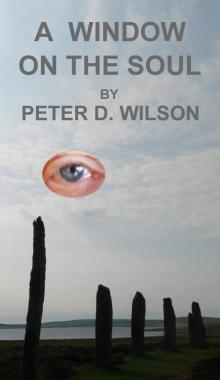 A Window on the Soul
A Window on the Soul_preview.jpg) Towards Sunset (third edition)
Towards Sunset (third edition)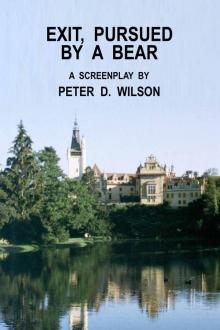 Exit, pursued by a bear
Exit, pursued by a bear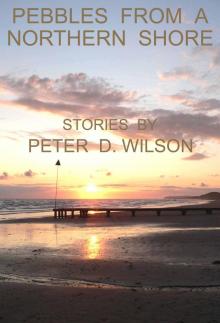 Pebbles from a Northern Shore
Pebbles from a Northern Shore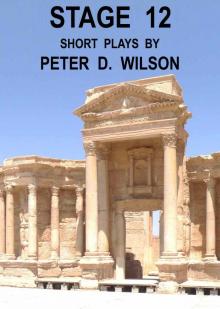 Stage 12
Stage 12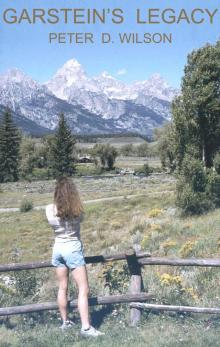 Garstein's Legacy
Garstein's Legacy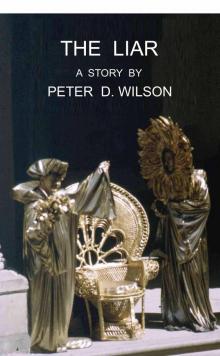 The Liar
The Liar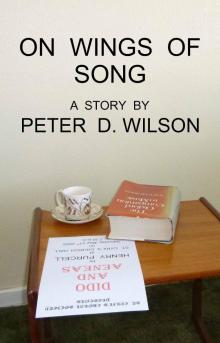 On Wings of Song
On Wings of Song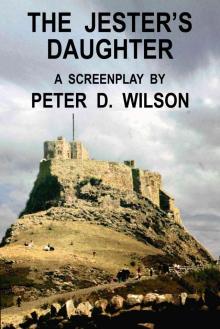 The Jester's Daughter
The Jester's Daughter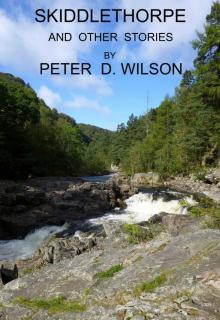 Skiddlethorpe and other stories
Skiddlethorpe and other stories